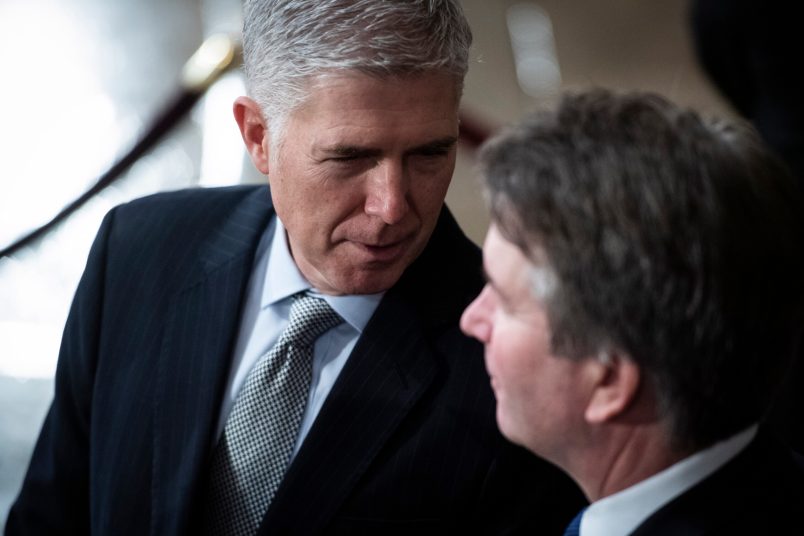Extreme vaccine skepticism got a showing at the Supreme Court on Friday.
Justices were hearing arguments in two cases challenging Biden administration COVID-19 directives: one vaccinate-or-test mandate on large, private-sector employers, and a vaccine mandate on health-care facility employees.
At various points throughout more than three hours of oral argument in the two matters, various attorneys for the challengers and two Supreme Court justices expressed skepticism of the vaccine in different ways, occasionally boosting the idea that the motives for the mandates were nefarious, or inflating the risk associated with vaccination.
Louisiana Solicitor General Elizabeth Murrill went the furthest, calling vaccines an “invasive medical procedure” while saying that the point of the regulations was raw power: “Exercising this kind of power to force the individual to submit to a medical treatment has never ever been something that has been authorized by Congress.”
Murrill was arguing against a rule, put forth by the Centers for Medicare and Medicaid Services, saying that facilities which participate in the federal programs must require staff to be vaccinated against the coronavirus.
It was the second of two arguments, following a session devoted to a vaccinate-or-test mandate imposed by OSHA. Of the two, legal experts expected the health-care worker mandate to fare better.
But during arguments over the health-care worker vaccine requirement, Justice Neil Gorusch raised a question about the law that governs CMS: doesn’t it prohibit the federal agency from controlling the tenure of individual staff?
The word “control” soon became critical, as Gorsuch asked what proclamations CMS could issue that would effectively “control” the behavior of staff.
“Could CMS also implement exercise regimes?” Gorsuch asked. Could it designate “substances that must be ingested by hospital employees in the name of safety, control?”
It’s the highest-level appearance of a meme on the far right and Fox News talking point: that vaccine mandates weren’t put into place for public health reasons — that they exist solely for the purpose of control.
Murrill, later on, echoed that argument, describing the vaccine mandate as a “bureaucratic power move that is unprecedented.”
The other glaring piece of anti-vaccine sentiment revealed itself in remarks from Justice Alito during arguments over the OSHA vaccinate-or-test mandate.
Alito took the unusual step of repeating, three times before making the point, “I am not making that point.”
“I am not saying the vaccines are unsafe,” he added. “I don’t want to be misunderstood, but I am sure that I will be misunderstood.”
He then made his point: “Some people who are vaccinated … will suffer adverse consequences.”
“There is some risk,” he added, asking Solicitor General Elizabeth Prelogar: “Do you dispute that?”
When Prelogar pointed out that the vaccines are “safe and effective,” Alito repeated multiple times: “I am not making that point,” before adding: “there is a risk.”
“Has OSHA ever imposed any other safety regulation that imposes some extra risk on the employee?” he asked.
Prelogar pointed out that there’s a cost-benefit analysis involved in any regulatory decision and that, in this case, the benefit outweighed the potential risk by “orders of magnitude.”
Alito’s line of questioning dramatically inflated the extent to which there is any risk at all in receiving vaccines, and lent voice and legitimacy to a movement that rejects a basic intervention that’s been a definitional public health success for the past century.
Throughout the arguments, however, there was a subtler piece of anti-vaccine thinking present in the lines of questioning advanced by conservative justices: that whether or not one gets the shot is only an individual decision — that while the vaccines may be effective, not getting the shot is purely a risk that some people are taking to themselves, without any potential collateral harm.
That’s not skepticism, necessarily.
To Alito, however, it could only ever be a matter of individual choice.
Does the mandate exist, he asked, “not to protect all employees, but only unvaccinated employees?”
But that strain of thinking did, throughout the arguments, distort the reason why the Biden administration imposed the mandates: to limit the spread of the virus, to reduce the strain on hospitals, and to constrain the potential for the virus to mutate further, at least in the United States.







Loves me a good dollop of karma. Also real life monty python:
I hope Kagan will be OK, Sotomayor was on zoom or whatever they use.
Alito is really playing fast and loose with words. OSHA’s mandate applies to all employees. It just so happens that a significant portion of the population has already complied. It’s like saying speed limits only regulate those people who drive at excessive rates of speed.
Shit. She’s getting the 'rona then.
Before covid, nobody used or had heard of zoom. Now everyone uses zoom and covid’s everywhere…
The two pozzes participated remotely.
Hey supremes, can we all get this, where everyone entering our workplace has to test negative, or is removed at gunpoint?